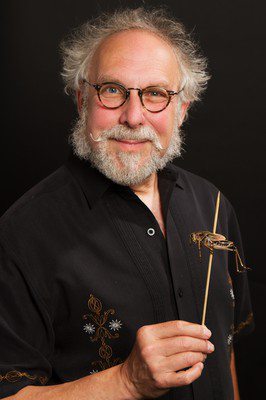He has been called a champion of the obscure, and David George Gordon, writer of Eat-A-Bug Cook Book, as well as books on slugs, snails, tarantulas and cockroaches, admits that is a fair description of himself.
“It’s easy to get people excited about orcas and eagles, but it’s more satisfying for me to write and talk about natures underdogs too,” said Gordon, shown right.
Gordon will be coming to the San Juan Islands on June 27, for his lecture, “Adventures in Entomophagy—Waiter, There’s No Fly in My Soup!” at 7 p.m., at the San Juan Island Library. The talk will include free samples of edible insect snacks.
Known as the “bug chef,” Gordon catered a cocktail hour at the Explorer’s Club Annual Dinner at the American Museum of Natural History in New York in 2015. Gordon said the gala was attended by 1,000 people in tuxedos and gowns, and, “I served [famous astrophysicist] Neil de Grasse Tyson his first tarantula spider,” he said proudly. Gordon has also made guest appearances on TV shows like Conan, The Wil Wheaton Project, Nightline and The View, and has given presentations at the Smithsonian Institute, Ripley’s Believe It or Not and the Singapore Food Festival.
Gordon’s adventures began in the 90s as he began wondering, “with an estimated 80 percent of the world’s cultures eating bugs, why don’t we?”
In 1996, Gordon was visiting the fair in Snohomish County when he tried his first bug.
“They were serving Chex Mix with oven-baked crickets. I was impressed, pretty tasty stuff,” Gordon said. He obviously was since he included a recipe based on it in his cookbook.
Of the insects he has tasted, Gordon recommends waxworms, small white caterpillars that turn in to the Galleria moth. “In the wild, they eat beeswax in honeycombs. What’s not to like?” Gordon asked. “When roasted, they taste like pistachios.” On the less desirable side, Gordon describes centipedes as having a weird chemical taste, “I don’t think they are particularly palatable.”
Statistically and nutrient wise, insects pack a more powerful punch than either beef or chicken, according to United Nation reports, and it takes far less energy to feed bugs than cattle. Farming grasshoppers, for example, could reduce harmful greenhouse gas emissions by as much as 60 percent.
According to Gordon, because Western culture is invested in agriculture as opposed to hunting and gathering, insects have become the enemy. “There’s been a lot of fear-mongering by pest control companies in the past. They make you think having just one bug in the house is horrid,” Gordon said, conjuring up images of assorted pesticide commercials. The health of the planet depends on bugs, he explained. Without insects, for example, flowers would have a hard time pollinating, and rotting material would take longer to decompose.
“Our fears about insects and spiders are not based on reality.”



